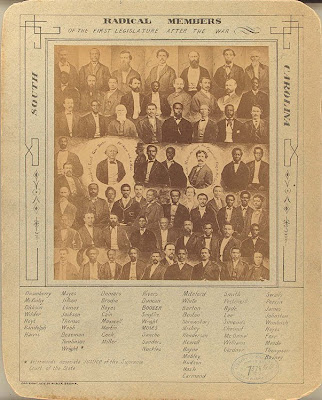The ruins of Richmond at the end of the Civil War. (National Archives)
Confederate prisoners held toward the end of the war (National Archives)
A somewhat posed photograph of soldiers from the United States Colored Troops (National Archives)
Members of the first Radical state legislature in South Carolina. (National Archives)
Louisiana Governor Henry Clay Warmoth (1868-1872)
Your textbook's chapter on Reconstruction does a good job of outlining the important details and themes in the overall narrative of this period in American History. After reading this chapter, you should have a good handle on all of the major phases (Presidential Reconstruction, Radical or Congressional Reconstruction, and the "Redemption" or overthrow of Reconstruction, Compromise of 1877, etc.) and the key figures associated with the era. Reconstruction is also important because it laid the foundation for the debate about civil rights in America, its most important legacies were probably the 14th and 15th Amendments to the Constitution.
Reconstruction was more than this standard narrative of political struggle, and your book also does a fairly good job of outlining the broader social challenges of the era, although it pays particular attention to the plight of the South's four million recently-freed slaves. In our lecture, we will consider what Reconstruction meant to some of these competing interest groups and the roles that they played in shaping political and social outcomes:
Freedmen
Former Confederate soldiers (the average soldier)
Union veterans (their counterpart)
Republicans (Northern and Southern)
Democrats (Northern and Southern)
Old Secessionists
Former Slaveholders and planters large and small
Poor whites
Former free people of color
Lastly, we will consider the memory of Reconstruction and the ways in which we write its history have been a metaphor for shifting values and interpretations in the intervening 135 years.





No comments:
Post a Comment